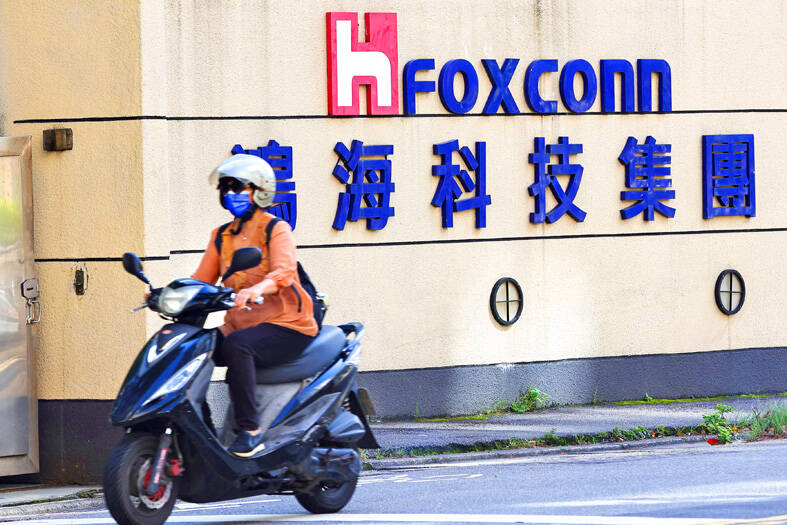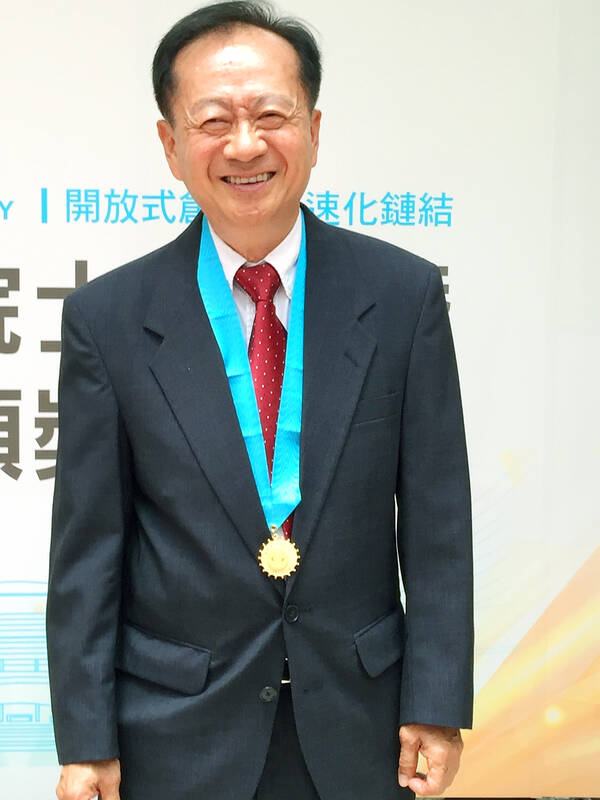Hon Hai Technology Group (鴻海科技集團) has hired former Taiwan Semiconductor Manufacturing Co (TSMC, 台積電) cochief operating officer Chiang Shang-yi (蔣尚義) as a strategy officer to assist its semiconductor business development, the group said yesterday.
Chiang’s appointment took effect immediately. He is to report directly to Hon Hai chairman Young Liu (劉揚偉).
Chiang was the central figure in TSMC’s technology advancement, and once considered a potential successor to TSMC founder and former chairman Morris Chang (張忠謀). He spent the past few years in China assisting Chinese chipmakers Semiconductor Manufacturing International Corp (中芯國際) and Wuhan Hongxin Semiconductor Corp (武漢弘芯半導體).

Photo: Ann Wang, Reuters
Chiang on Oct. 18 attended a Hon Hai technology forum in Taipei, prompting speculation that he might join the Apple Inc supplier.
Bob Chen (陳偉銘), president of Hon Hai’s semiconductor business group, is a former colleague of Chiang’s from TSMC.
“Chiang’s rich experience in the semiconductor industry will provide Hon Hai invaluable support for the group’s global semiconductor deployment strategy and technical guidance,” Liu said in a statement. “We are grateful to have such a seasoned semiconductor veteran join us at this important juncture in the group’s development.”

File photo: Liberty Times
Hon Hai last year accelerated the pace of its semiconductor capacity deployment in response to rising customer demand following a two-year chip crunch, Liu said in August.
The iPhone assembler purchases about US$60 billion of chips a year, and would focus on making chips used in electric vehicles and electronics, he said, adding that the company would not compete with chipmakers.
Hon Hai has said it is looking to build semiconductor capacity in Malaysia and India through its partnerships with local companies.
The company said it hopes its efforts in developing microcontrollers, power semiconductors, and light detection and ranging technology would bear fruit within three years.
It also said it expects to launch volume production of chips using mature technology in 2024 and start supplying auto chips to customers in 2025.
In related news, Intel Corp executive Randhir Thakur, who oversaw a key part of the company’s comeback plan — its push into the contract-manufacturing industry — is leaving the chipmaker.
Thakur “has decided to step down from his position to pursue opportunities outside the company,” Intel said in an e-mailed statement on Monday. “He will stay on through the first quarter of 2023 to ensure a smooth transition to a new leader.”
The departure marks a shakeup for chief executive officer Pat Gelsinger’s turnaround plan.
After losing its role as the leader of the US$580 billion chip industry, Intel has set out to expand its operations. That includes becoming a so-called foundry — a business that makes chips for other companies. It is an area dominated by TSMC and Samsung Electronics Co, two companies that are unlikely to cede their territory easily.
Additional reporting by Bloomberg

In Italy’s storied gold-making hubs, jewelers are reworking their designs to trim gold content as they race to blunt the effect of record prices and appeal to shoppers watching their budgets. Gold prices hit a record high on Thursday, surging near US$5,600 an ounce, more than double a year ago as geopolitical concerns and jitters over trade pushed investors toward the safe-haven asset. The rally is putting undue pressure on small artisans as they face mounting demands from customers, including international brands, to produce cheaper items, from signature pieces to wedding rings, according to interviews with four independent jewelers in Italy’s main

Macronix International Co (旺宏), the world’s biggest NOR flash memory supplier, yesterday said it would spend NT$22 billion (US$699.1 million) on capacity expansion this year to increase its production of mid-to-low-density memory chips as the world’s major memorychip suppliers are phasing out the market. The company said its planned capital expenditures are about 11 times higher than the NT$1.8 billion it spent on new facilities and equipment last year. A majority of this year’s outlay would be allocated to step up capacity of multi-level cell (MLC) NAND flash memory chips, which are used in embedded multimedia cards (eMMC), a managed

Japanese Prime Minister Sanae Takaichi has talked up the benefits of a weaker yen in a campaign speech, adopting a tone at odds with her finance ministry, which has refused to rule out any options to counter excessive foreign exchange volatility. Takaichi later softened her stance, saying she did not have a preference for the yen’s direction. “People say the weak yen is bad right now, but for export industries, it’s a major opportunity,” Takaichi said on Saturday at a rally for Liberal Democratic Party candidate Daishiro Yamagiwa in Kanagawa Prefecture ahead of a snap election on Sunday. “Whether it’s selling food or

In the wake of strong global demand for AI applications, Taiwan’s export-oriented economy accelerated with the composite index of economic indicators flashing the first “red” light in December for one year, indicating the economy is in booming mode, the National Development Council (NDC) said yesterday. Moreover, the index of leading indicators, which gauges the potential state of the economy over the next six months, also moved higher in December amid growing optimism over the outlook, the NDC said. In December, the index of economic indicators rose one point from a month earlier to 38, at the lower end of the “red” light.